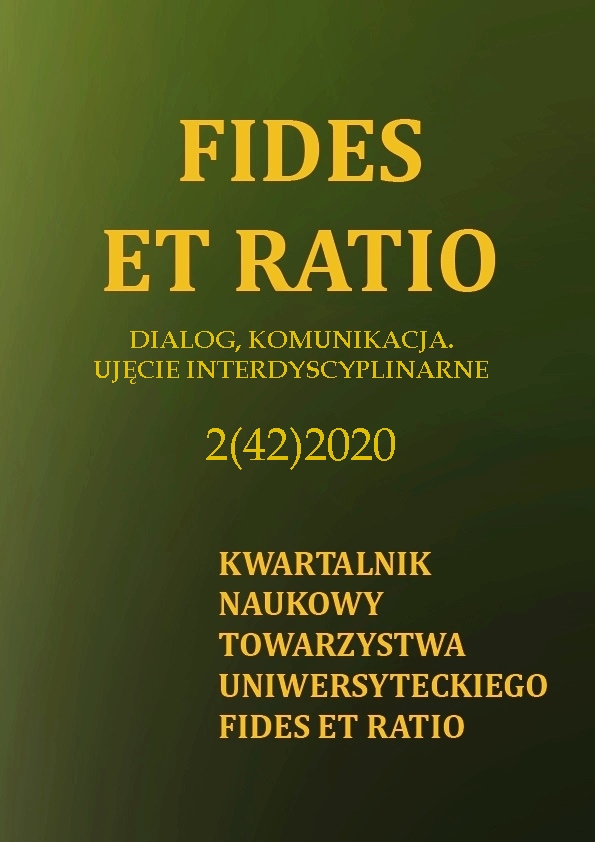Abstract
The paper discusses the problem of otherness in terms of Paul Ricoeur. The valuable contribution of this French philosopher is not only the phenomenological description of the experience of otherness, but the search for its ontological principle in reference to Plato. As a result, his research is conducted in two planes: phenomenological and ontological one. The otherness is an ontological category which, together with identity, dialectically constitutes being. It then reveals itself in various passivity phenomena, of which Ricoeur discusses three: the own body, the other, and the conscience. The otherness is therefore polysemical and dialectical: it is a multitude of forms operating within the subject. Appreciating Ricoeur's contribution, we finally ask a few questions about his concept, especially regarding the passive nature of the experience of otherness and its closed catalog.
References
Baraquin, N. et coll. (1995). Dictionnaire de philosophie, Paris: Armand Colin.
Bréhier, E. (1938). Histoire de la philosophie, tome 1, Paris: PUF.
Depraz, N. (1999). Husserl, Paris: Armand Colin.
Foulquié, P. (1992). Dictionnaire de la langue philosophique, Paris: PUF.
Franck, D. (1981). Chair et corps. Sur la phénoménologie de Husserl, Paris: Minuit.
Greisch, J. (2017). „Les yeux de Husserl en France. Les tentatives de refondation de la phénoménologie dans la deuxième moitié du XXe siècle”, Phénoménologie: un siècle de philosophie, éd. P. Dupond, L. Cournarie, Paris: Ellipses, pp. 45-74.
Henry, M. (1965). Philosophie et phénoménologie du corps. Essai sur l’ontologie biranienne, Paris: PUF.
Huneman, Ph., Kulich, E. (1997). Introduction à la phénoménologie, Paris: Armand Colin.
Husserl, E. (1994). Méditations cartésiennes, trad. M. de Launay, Paris: PUF.
Ingarden, R. (1971). „O poznawaniu cudzych stanów psychicznych”, U podstaw teorii poznania, Warszawa: PWN.
Jervolino, D. (2002). Paul Ricoeur. Une herméneutique de la condition humaine, Paris: Ellipses.
Laoureux, S. (2013). „Vers quelle ontologie du corps propre? Remarques sur la phénoménologie herméneutique et la phénoménologie matérielle à partir d’une référence de Soi-même comme un autre à Michel Henry”, L’Éthique et le soi chez Paul Ricoeur, éd. P. Canivez, L. Couloubaritsis, Lille: Presses Universitaires du Septentrion, pp. 177-195.
Levinas, E. (1971). Totalité et infini. Essai sur l’extériorité, La Haye: Martinus Nijhof.
Maine de Biran, P. (1988). Mémoire sur la décomposition de la pensée, Paris: J. Vrin.
Platon, (2002). La République, trad. G. Leroux, Paris: Flammarion.
Platon, (1989). Le Banquet, trad. P. Vicaire, Paris: Les Belles Lettres.
Platon, (1999). Phédon, trad. M. Dixsaut, Paris: Flammarion.
Platon, (2006). Phèdre, trad. L. Brisson, Paris: Flammarion.
Ricoeur, P. (2013). Anthropologie philosophique. Écrits et conférences 3, Paris: Éditions du Seuil.
Ricoeur, P. (2013a). „La souffrance n’est pas la douleur”, Souffrance et douleur. Autour de Paul Ricoeur, red. C. Marin, N. Zaccaï-Reyners, Paris: PUF, pp. 13-33.
Ricoeur, P. (2002). „Lectio magistralis”, Paul Ricoeur. Une herméneutique de la condition humaine, Paris: Ellipses, pp. 75-91.
Ricœur, P. (1990). Soi-mȇme comme un autre, Paris: Éditions du Seuil.
Tiaha, D. (2009). Paul Ricoeur et le paradoxe de la chair, Paris: L’Harmattan.
